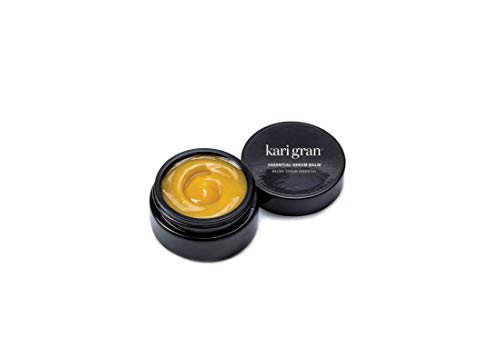
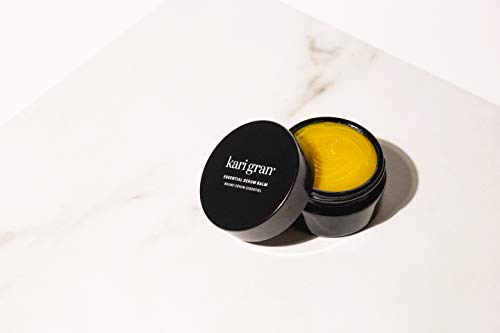
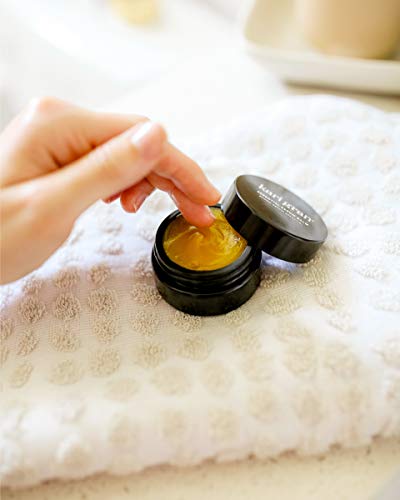
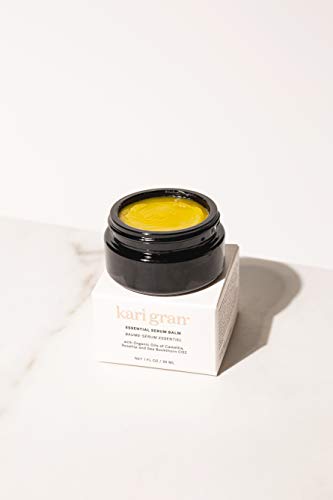
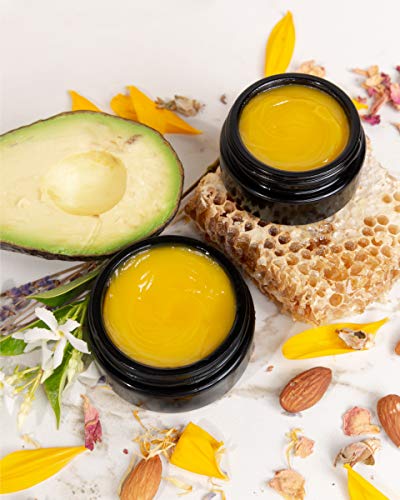
Kari Gran Body Butter - Nourishing Serum Balm with Organic Oils, Velvety Finish - 50ml


Cananga Odorata (Ylang Ylang) Oil
High RiskCananga odorata (ylang ylang) oil is an essential oil derived from the flowers of the ylang ylang tree. It is primarily used in cosmetic and fragrance formulations for its aromatic properties and as a fixative in perfumes.
Sustai Insights
Ylang ylang oil offers functional benefits as a fragrance and fixative, with potential sustainability credentials depending on sourcing practices. However, it has a high allergenic potential, posing risks of skin irritation and sensitization. Regulatory bodies have noted restrictions on its use in certain products. Overall, the ingredient presents a high risk due to health concerns and potential exposure from multiple sources.
Rosa Damascena (Rose) Flower Oil
High RiskRosa damascena (rose) flower oil is an essential oil derived from the petals of the rose plant. It is commonly used in cosmetic formulations for its fragrance and potential skin-soothing properties. The oil is often included in perfumes, creams, and other personal care products for its aromatic qualities.
Sustai Insights
Rosa damascena (rose) flower oil offers functional benefits such as providing fragrance and potential skin-soothing effects. However, it has a high allergenic potential, posing risks of irritation and sensitization, particularly for sensitive individuals. Environmentally, it presents low risks, with no significant pollutant or bioaccumulation concerns. Regulatory status is marked with some restrictions under the EU cosmetics directive. Overall, the ingredient is assessed as high risk due to its allergenic properties, highlighting the need for caution in usage, particularly among vulnerable populations. Alternatives include synthetic fragrances or less allergenic floral oils.
Olea Europaea (Olive) Extract
Low RiskOlea europaea (olive) fruit extract is obtained from the fruit of the olive tree. It is commonly used in cosmetic and personal care products due to its moisturizing properties and potential antioxidant benefits. Its primary function is to enhance skin hydration and provide a natural source of beneficial compounds.
Sustai Insights
Olea europaea (olive) extract is valued for its moisturizing and antioxidant properties, contributing positively to skin health and hydration. It is sustainably sourced and generally recognized as safe, with low risks for carcinogenicity, allergies, and reproductive toxicity. Environmental concerns are minimal, and there are no significant regulatory warnings. Overall, the risk level associated with this ingredient is low, making it a suitable option in various formulations. Safe usage practices should be observed, though alternatives like jojoba oil or argan oil may offer similar benefits.
Jasminum Sambac (Arabian Jasmine) Flower Oil
Low RiskJasminum sambac, commonly known as Arabian jasmine flower oil, is an essential oil extracted from the flowers of the jasmine plant. It is primarily used in personal care products for its aromatic properties and may serve as a fragrance component in various formulations.
Sustai Insights
Arabian jasmine flower oil offers functional benefits as a fragrant agent, enhancing product appeal through its pleasant scent. It is generally recognized as low risk regarding health concerns, including carcinogenicity, allergies, and reproductive toxicity. There are no significant environmental risks associated with its use, and it complies with current regulations. Safe usage practices should be followed, and while alternatives exist, they may not replicate its unique scent profile. Overall, this ingredient is assessed as low risk.
Beeswax
Low RiskBeeswax is the purified wax obtained from the honeycomb of honeybees. It is typically used as a thickening agent, emulsifier, or to provide structure in various cosmetic and personal care products.
Sustai Insights
Beeswax offers functional benefits as a natural emulsifier and thickening agent, contributing to product stability and texture. It is biodegradable and sustainably sourced, aligning with eco-friendly practices. Health risks are low, with minimal concerns regarding carcinogenicity, allergies, or irritation. Environmental risks are also low, with no significant pollutant or bioaccumulation issues. Regulatory bodies impose few restrictions, confirming its safety in use. Safe usage practices should be followed, and alternatives like plant-based waxes may be considered for those seeking vegan options. Overall, the risk level associated with beeswax is low.
Caledula Officinalis Extract
Low RiskCalendula officinalis extract is derived from the flowers of the calendula plant. It is commonly used in cosmetic and personal care products for its soothing and anti-inflammatory properties.
Sustai Insights
Calendula extract offers functional benefits such as skin soothing and anti-inflammatory effects, making it useful in topical formulations. It is generally considered low risk for health concerns, including carcinogenicity, allergies, and reproductive toxicity. Environmental impact is minimal, with no significant pollutant potential noted. It is compliant with regulatory standards and has no known restrictions. Safe usage practices include conducting patch tests to avoid allergic reactions, and alternatives may include other botanical extracts like chamomile. Overall, the ingredient is assessed to have a low risk.
Prunus Amygdalus Dulcis (Sweet Almond) Oil
Low RiskPrunus amygdalus dulcis (sweet almond) oil is derived from the seeds of the almond tree. It is commonly used in cosmetic formulations for its moisturizing properties and as a carrier oil for other active ingredients. Its light texture allows for easy absorption into the skin.
Sustai Insights
Sweet almond oil provides functional benefits such as effective skin hydration and enhancement of skin absorption for other compounds. It is sustainably sourced and biodegradable. Health risks are low, with minimal concerns regarding carcinogenicity, allergies, and reproductive toxicity. Environmental risks are also low, with no significant pollutant or bioaccumulation potential. Regulatory bodies currently do not impose restrictions on its use. Overall, the risk assessment indicates a low risk level, making it a safe choice in cosmetic applications.
Persea Gratissima (Avocado) Oil
Low RiskPersea gratissima (avocado) oil is derived from the fruit of the avocado tree. It is commonly used in cosmetic formulations for its moisturizing properties, serving as an emollient that enhances skin hydration and improves product texture.
Sustai Insights
Avocado oil offers functional benefits as a moisturizer and emollient, known for its ability to nourish and hydrate the skin. It is sustainably sourced and biodegradable. Health risks are minimal, with low concerns regarding carcinogenicity, allergies, and reproductive toxicity. Environmental risks are also low, with no significant pollutant or bioaccumulation potential. Regulatory bodies have not issued warnings against its use. Overall, the ingredient is assessed as low risk, making it a safe choice for cosmetic applications.
Lavandula Hybrida Oil
Low RiskLavandula hybrida oil is an essential oil obtained from the hybrid lavender plant, known for its aromatic properties and use in various cosmetic and therapeutic applications. It is commonly used for its fragrance and potential calming effects in personal care products.
Sustai Insights
Lavandula hybrida oil offers functional benefits as a fragrance and may have mild calming effects. It is sustainably sourced and typically presents low risks for carcinogenicity, allergies, and reproductive toxicity. However, it carries low to moderate concerns about endocrine disruption. Environmental impacts are minimal, and it is not currently subject to significant regulatory restrictions. Overall, the risk level associated with this ingredient is low, making it a relatively safe option in product formulations.
Rosa Canina (Dog Rose) Fruit Oil
Low RiskRosa canina (dog rose) fruit oil is derived from the fruit of the dog rose plant. It is commonly used in cosmetics for its emollient properties, helping to moisturize and soothe the skin. Additionally, it may contain bioactive compounds that contribute to its potential skin benefits.
Sustai Insights
Rosa canina fruit oil offers functional benefits as a moisturizer and skin conditioner, with sustainable sourcing potential. Health risks are low, with minimal concerns regarding carcinogenicity, allergies, or reproductive toxicity. Environmental risks are also low, with no significant pollutant potential. Regulatory agencies do not list it under restrictions, indicating its safety for use. Overall, the risk level is assessed as low, making it a suitable ingredient for cosmetic formulations.
Hippophae Rhamnoides (Sea Buckthorn) Extract
Low RiskHippophae rhamnoides extract is derived from the sea buckthorn plant, known for its rich nutrient profile, including vitamins, fatty acids, and antioxidants. It is commonly used in cosmetic and personal care products for its potential skin benefits, such as hydration and nourishment.
Sustai Insights
Hippophae rhamnoides extract offers functional benefits like enhancing skin hydration and providing antioxidant properties. It is sustainably sourced and generally considered low risk for health concerns, including carcinogenicity and allergies. Environmental impacts are minimal, with no evidence of bioaccumulation or pollution. Regulatory bodies have not issued any significant warnings. Overall, the risk level associated with this ingredient is low, making it a suitable choice for various applications.
Camellia Oleifera Seed Oil
Low RiskCamellia oleifera seed oil is an extract from the seeds of the Camellia oleifera plant, commonly used in cosmetic formulations for its moisturizing properties and potential skin benefits.
Sustai Insights
Camellia oleifera seed oil offers functional benefits as a moisturizer and emollient, being biodegradable and typically sustainably sourced. Health risks are low, with minimal concerns regarding carcinogenicity, allergenic potential, and reproductive toxicity. Environmental risks are also low, as it does not contribute significantly to pollution or bioaccumulation. Regulatory bodies do not impose restrictions on its use. Overall, the ingredient poses low risk when used appropriately, making it a favorable option in cosmetic products.
Olea Europaea (Olive)
Low RiskOlea europaea (olive) is derived from the fruit of the olive tree, primarily known for its oil. It serves various purposes in personal care products, including moisturizing and antioxidant properties, contributing to skin hydration and protection.
Sustai Insights
Olea europaea (olive) oil has functional benefits such as moisturizing and providing antioxidants. It is sustainably sourced and biodegradable. Health risks are minimal, with low potential for carcinogenicity, allergenicity, or reproductive toxicity. Environmental concerns are also low, without significant pollutant potential. Regulatory status is clear, with no current restrictions. Overall, the risk level is low, and it can be safely used in products with standard precautions. Alternatives like jojoba oil may offer similar benefits.
Frankincense Oil
Low RiskFrankincense oil is an essential oil derived from the resin of Boswellia trees, commonly used in aromatherapy, cosmetics, and personal care products. It is valued for its potential aromatic properties and is often included for its soothing fragrance.
Sustai Insights
Frankincense oil offers functional benefits such as providing a calming scent and potential skin-soothing properties. It is typically regarded as low risk for health concerns, including cancer, allergies, and reproductive toxicity. Environmentally, it poses low risks, with no significant pollutant potential or bioaccumulation noted. Regulatory agencies have not issued warnings against its use, indicating a favorable status. Safe usage practices include diluting the oil before topical application. Overall, the assessment suggests a low risk associated with frankincense oil.
Tocopherol
Low RiskTocopherols are a class of naturally occurring compounds, primarily known for their role as antioxidants. They are commonly used in cosmetic and skincare products to help stabilize formulations and protect ingredients from oxidative damage.
Sustai Insights
Tocopherols provide functional benefits such as antioxidant protection and skin conditioning. They are generally recognized as safe, with low concerns regarding carcinogenicity, allergies, and reproductive toxicity. However, enhanced skin absorption and potential endocrine disruption are noted. Regulatory bodies have not imposed significant restrictions on tocopherols, categorizing the overall risk as low. Safe usage practices should be observed, and while alternatives exist, tocopherols remain a viable option in formulations.
Helianthus Annuus (Sunflower) Seed Oil
Low RiskHelianthus annuus (sunflower) seed oil is derived from the seeds of the sunflower plant. It serves primarily as an emollient and moisturizer in cosmetic formulations, helping to maintain skin hydration and improve texture.
Sustai Insights
Sunflower seed oil is effective as an emollient, providing moisture and improving skin texture while being biodegradable and sustainably sourced. It poses low health risks, including negligible concerns for carcinogenicity, allergies, or reproductive toxicity. Environmentally, it does not significantly contribute to pollution or bioaccumulation. Regulatory bodies currently do not list any advisories for this ingredient. Overall, it is assessed as low risk, with safe usage practices recommended. Alternatives include oils like jojoba or almond oil for those seeking different properties.
Simmondsia Chinensis (Jojoba) Seed Oil
Low RiskSimmondsia chinensis (jojoba) seed oil is extracted from the seeds of the jojoba plant. It is commonly used in cosmetics for its moisturizing properties and ability to mimic human sebum, making it beneficial for skin and hair care formulations.
Sustai Insights
Jojoba seed oil offers functional benefits such as effective moisturization and emollience, contributing to skin hydration and smoothness. It is sustainably sourced and biodegradable. Health risks are low, with minimal concerns regarding carcinogenicity, allergies, and reproductive toxicity. Environmental risks are also low, as it does not significantly contribute to pollution or bioaccumulation. Currently, there are no regulatory restrictions on its use. Overall, the risk level is low, and it is considered a safe ingredient with no significant adverse effects.
Olea Europaea (Olive) Extract
Low RiskOlea europaea (olive) fruit extract is obtained from the fruit of the olive tree. It is commonly used in cosmetic and personal care products due to its moisturizing properties and potential antioxidant benefits. Its primary function is to enhance skin hydration and provide a natural source of beneficial compounds.
Sustai Insights
Olea europaea (olive) extract is valued for its moisturizing and antioxidant properties, contributing positively to skin health and hydration. It is sustainably sourced and generally recognized as safe, with low risks for carcinogenicity, allergies, and reproductive toxicity. Environmental concerns are minimal, and there are no significant regulatory warnings. Overall, the risk level associated with this ingredient is low, making it a suitable option in various formulations. Safe usage practices should be observed, though alternatives like jojoba oil or argan oil may offer similar benefits.
Cananga Odorata (Ylang Ylang) Oil
High RiskCananga odorata (ylang ylang) oil is an essential oil derived from the flowers of the ylang ylang tree. It is primarily used in cosmetic and fragrance formulations for its aromatic properties and as a fixative in perfumes.
Sustai Insights
Ylang ylang oil offers functional benefits as a fragrance and fixative, with potential sustainability credentials depending on sourcing practices. However, it has a high allergenic potential, posing risks of skin irritation and sensitization. Regulatory bodies have noted restrictions on its use in certain products. Overall, the ingredient presents a high risk due to health concerns and potential exposure from multiple sources.
Jasminum Sambac (Arabian Jasmine) Flower Oil
Low RiskJasminum sambac, commonly known as Arabian jasmine flower oil, is an essential oil extracted from the flowers of the jasmine plant. It is primarily used in personal care products for its aromatic properties and may serve as a fragrance component in various formulations.
Sustai Insights
Arabian jasmine flower oil offers functional benefits as a fragrant agent, enhancing product appeal through its pleasant scent. It is generally recognized as low risk regarding health concerns, including carcinogenicity, allergies, and reproductive toxicity. There are no significant environmental risks associated with its use, and it complies with current regulations. Safe usage practices should be followed, and while alternatives exist, they may not replicate its unique scent profile. Overall, this ingredient is assessed as low risk.
Beeswax
Low RiskBeeswax is the purified wax obtained from the honeycomb of honeybees. It is typically used as a thickening agent, emulsifier, or to provide structure in various cosmetic and personal care products.
Sustai Insights
Beeswax offers functional benefits as a natural emulsifier and thickening agent, contributing to product stability and texture. It is biodegradable and sustainably sourced, aligning with eco-friendly practices. Health risks are low, with minimal concerns regarding carcinogenicity, allergies, or irritation. Environmental risks are also low, with no significant pollutant or bioaccumulation issues. Regulatory bodies impose few restrictions, confirming its safety in use. Safe usage practices should be followed, and alternatives like plant-based waxes may be considered for those seeking vegan options. Overall, the risk level associated with beeswax is low.
Caledula Officinalis Extract
Low RiskCalendula officinalis extract is derived from the flowers of the calendula plant. It is commonly used in cosmetic and personal care products for its soothing and anti-inflammatory properties.
Sustai Insights
Calendula extract offers functional benefits such as skin soothing and anti-inflammatory effects, making it useful in topical formulations. It is generally considered low risk for health concerns, including carcinogenicity, allergies, and reproductive toxicity. Environmental impact is minimal, with no significant pollutant potential noted. It is compliant with regulatory standards and has no known restrictions. Safe usage practices include conducting patch tests to avoid allergic reactions, and alternatives may include other botanical extracts like chamomile. Overall, the ingredient is assessed to have a low risk.
Prunus Amygdalus Dulcis (Sweet Almond) Oil
Low RiskPrunus amygdalus dulcis (sweet almond) oil is derived from the seeds of the almond tree. It is commonly used in cosmetic formulations for its moisturizing properties and as a carrier oil for other active ingredients. Its light texture allows for easy absorption into the skin.
Sustai Insights
Sweet almond oil provides functional benefits such as effective skin hydration and enhancement of skin absorption for other compounds. It is sustainably sourced and biodegradable. Health risks are low, with minimal concerns regarding carcinogenicity, allergies, and reproductive toxicity. Environmental risks are also low, with no significant pollutant or bioaccumulation potential. Regulatory bodies currently do not impose restrictions on its use. Overall, the risk assessment indicates a low risk level, making it a safe choice in cosmetic applications.
Persea Gratissima (Avocado) Oil
Low RiskPersea gratissima (avocado) oil is derived from the fruit of the avocado tree. It is commonly used in cosmetic formulations for its moisturizing properties, serving as an emollient that enhances skin hydration and improves product texture.
Sustai Insights
Avocado oil offers functional benefits as a moisturizer and emollient, known for its ability to nourish and hydrate the skin. It is sustainably sourced and biodegradable. Health risks are minimal, with low concerns regarding carcinogenicity, allergies, and reproductive toxicity. Environmental risks are also low, with no significant pollutant or bioaccumulation potential. Regulatory bodies have not issued warnings against its use. Overall, the ingredient is assessed as low risk, making it a safe choice for cosmetic applications.
Lavandula Hybrida Oil
Low RiskLavandula hybrida oil is an essential oil obtained from the hybrid lavender plant, known for its aromatic properties and use in various cosmetic and therapeutic applications. It is commonly used for its fragrance and potential calming effects in personal care products.
Sustai Insights
Lavandula hybrida oil offers functional benefits as a fragrance and may have mild calming effects. It is sustainably sourced and typically presents low risks for carcinogenicity, allergies, and reproductive toxicity. However, it carries low to moderate concerns about endocrine disruption. Environmental impacts are minimal, and it is not currently subject to significant regulatory restrictions. Overall, the risk level associated with this ingredient is low, making it a relatively safe option in product formulations.
Rosa Canina (Dog Rose) Fruit Oil
Low RiskRosa canina (dog rose) fruit oil is derived from the fruit of the dog rose plant. It is commonly used in cosmetics for its emollient properties, helping to moisturize and soothe the skin. Additionally, it may contain bioactive compounds that contribute to its potential skin benefits.
Sustai Insights
Rosa canina fruit oil offers functional benefits as a moisturizer and skin conditioner, with sustainable sourcing potential. Health risks are low, with minimal concerns regarding carcinogenicity, allergies, or reproductive toxicity. Environmental risks are also low, with no significant pollutant potential. Regulatory agencies do not list it under restrictions, indicating its safety for use. Overall, the risk level is assessed as low, making it a suitable ingredient for cosmetic formulations.
Hippophae Rhamnoides (Sea Buckthorn) Extract
Low RiskHippophae rhamnoides extract is derived from the sea buckthorn plant, known for its rich nutrient profile, including vitamins, fatty acids, and antioxidants. It is commonly used in cosmetic and personal care products for its potential skin benefits, such as hydration and nourishment.
Sustai Insights
Hippophae rhamnoides extract offers functional benefits like enhancing skin hydration and providing antioxidant properties. It is sustainably sourced and generally considered low risk for health concerns, including carcinogenicity and allergies. Environmental impacts are minimal, with no evidence of bioaccumulation or pollution. Regulatory bodies have not issued any significant warnings. Overall, the risk level associated with this ingredient is low, making it a suitable choice for various applications.
Camellia Oleifera Seed Oil
Low RiskCamellia oleifera seed oil is an extract from the seeds of the Camellia oleifera plant, commonly used in cosmetic formulations for its moisturizing properties and potential skin benefits.
Sustai Insights
Camellia oleifera seed oil offers functional benefits as a moisturizer and emollient, being biodegradable and typically sustainably sourced. Health risks are low, with minimal concerns regarding carcinogenicity, allergenic potential, and reproductive toxicity. Environmental risks are also low, as it does not contribute significantly to pollution or bioaccumulation. Regulatory bodies do not impose restrictions on its use. Overall, the ingredient poses low risk when used appropriately, making it a favorable option in cosmetic products.
Olea Europaea (Olive)
Low RiskOlea europaea (olive) is derived from the fruit of the olive tree, primarily known for its oil. It serves various purposes in personal care products, including moisturizing and antioxidant properties, contributing to skin hydration and protection.
Sustai Insights
Olea europaea (olive) oil has functional benefits such as moisturizing and providing antioxidants. It is sustainably sourced and biodegradable. Health risks are minimal, with low potential for carcinogenicity, allergenicity, or reproductive toxicity. Environmental concerns are also low, without significant pollutant potential. Regulatory status is clear, with no current restrictions. Overall, the risk level is low, and it can be safely used in products with standard precautions. Alternatives like jojoba oil may offer similar benefits.
Frankincense Oil
Low RiskFrankincense oil is an essential oil derived from the resin of Boswellia trees, commonly used in aromatherapy, cosmetics, and personal care products. It is valued for its potential aromatic properties and is often included for its soothing fragrance.
Sustai Insights
Frankincense oil offers functional benefits such as providing a calming scent and potential skin-soothing properties. It is typically regarded as low risk for health concerns, including cancer, allergies, and reproductive toxicity. Environmentally, it poses low risks, with no significant pollutant potential or bioaccumulation noted. Regulatory agencies have not issued warnings against its use, indicating a favorable status. Safe usage practices include diluting the oil before topical application. Overall, the assessment suggests a low risk associated with frankincense oil.
Rosa Damascena (Rose) Flower Oil
High RiskRosa damascena (rose) flower oil is an essential oil derived from the petals of the rose plant. It is commonly used in cosmetic formulations for its fragrance and potential skin-soothing properties. The oil is often included in perfumes, creams, and other personal care products for its aromatic qualities.
Sustai Insights
Rosa damascena (rose) flower oil offers functional benefits such as providing fragrance and potential skin-soothing effects. However, it has a high allergenic potential, posing risks of irritation and sensitization, particularly for sensitive individuals. Environmentally, it presents low risks, with no significant pollutant or bioaccumulation concerns. Regulatory status is marked with some restrictions under the EU cosmetics directive. Overall, the ingredient is assessed as high risk due to its allergenic properties, highlighting the need for caution in usage, particularly among vulnerable populations. Alternatives include synthetic fragrances or less allergenic floral oils.
Tocopherol
Low RiskTocopherols are a class of naturally occurring compounds, primarily known for their role as antioxidants. They are commonly used in cosmetic and skincare products to help stabilize formulations and protect ingredients from oxidative damage.
Sustai Insights
Tocopherols provide functional benefits such as antioxidant protection and skin conditioning. They are generally recognized as safe, with low concerns regarding carcinogenicity, allergies, and reproductive toxicity. However, enhanced skin absorption and potential endocrine disruption are noted. Regulatory bodies have not imposed significant restrictions on tocopherols, categorizing the overall risk as low. Safe usage practices should be observed, and while alternatives exist, tocopherols remain a viable option in formulations.
Helianthus Annuus (Sunflower) Seed Oil
Low RiskHelianthus annuus (sunflower) seed oil is derived from the seeds of the sunflower plant. It serves primarily as an emollient and moisturizer in cosmetic formulations, helping to maintain skin hydration and improve texture.
Sustai Insights
Sunflower seed oil is effective as an emollient, providing moisture and improving skin texture while being biodegradable and sustainably sourced. It poses low health risks, including negligible concerns for carcinogenicity, allergies, or reproductive toxicity. Environmentally, it does not significantly contribute to pollution or bioaccumulation. Regulatory bodies currently do not list any advisories for this ingredient. Overall, it is assessed as low risk, with safe usage practices recommended. Alternatives include oils like jojoba or almond oil for those seeking different properties.
Simmondsia Chinensis (Jojoba) Seed Oil
Low RiskSimmondsia chinensis (jojoba) seed oil is extracted from the seeds of the jojoba plant. It is commonly used in cosmetics for its moisturizing properties and ability to mimic human sebum, making it beneficial for skin and hair care formulations.
Sustai Insights
Jojoba seed oil offers functional benefits such as effective moisturization and emollience, contributing to skin hydration and smoothness. It is sustainably sourced and biodegradable. Health risks are low, with minimal concerns regarding carcinogenicity, allergies, and reproductive toxicity. Environmental risks are also low, as it does not significantly contribute to pollution or bioaccumulation. Currently, there are no regulatory restrictions on its use. Overall, the risk level is low, and it is considered a safe ingredient with no significant adverse effects.
Experience the nourishing touch of Kari Gran Essential Serum Balm, a premium body butter designed for both face and body. Infused with organic oils like Rosehip and Jojoba, this moisturizing balm delivers long-lasting hydration while providing a velvety finish that locks in moisture. Perfect for those who prioritize natural skincare, its gentle yet effective formula is ideal for dry, cracked skin and even serves as a face balm. A little goes a long way, making it cost-effective and durable for daily use. Embrace self-care with a product that champions sustainability and health benefits, making it a trusted choice for environmentally conscious consumers.
- Nourishing Hydration: Packed with organic oils including Rosehip and Jojoba, this balm deeply moisturizes and nourishes the skin.
- Versatile Use: Gentle enough for facial application yet potent for the driest body areas, perfect for cracked hands.
- Long-Lasting Barrier: Finished with organic beeswax, it creates a barrier to lock in moisture.
- Easy Application: Simply warm between hands and massage onto skin for optimal absorption.
- Sustainable Ingredients: Made with organic essential oils, this balm supports your health and the planet.
Subscribe & Save with Sustai
- Best Price Guarantee: Always enjoy the lowest prices on sustainable home essentials.
- No Surprises: We’ll notify you before shipping. No hidden fees, ever.
- You’re in Charge: Change, pause, or cancel your subscription anytime with ease.
- Eco-Friendly Deliveries: Our grouped shipments mean less packaging and lower emissions.
Join us on a sustainable journey. Special offers for a limited time! Prices and promotions may change.
Recommended Products
Experience the nourishing touch of Kari Gran Essential Serum Balm, a premium body butter designed for both face and body. Infused with organic oils like Rosehip and Jojoba, this moisturizing balm delivers long-lasting hydration while providing a velvety finish that locks in moisture. Perfect for those who prioritize natural skincare, its gentle yet effective formula is ideal for dry, cracked skin and even serves as a face balm. A little goes a long way, making it cost-effective and durable for daily use. Embrace self-care with a product that champions sustainability and health benefits, making it a trusted choice for environmentally conscious consumers.
- Nourishing Hydration: Packed with organic oils including Rosehip and Jojoba, this balm deeply moisturizes and nourishes the skin.
- Versatile Use: Gentle enough for facial application yet potent for the driest body areas, perfect for cracked hands.
- Long-Lasting Barrier: Finished with organic beeswax, it creates a barrier to lock in moisture.
- Easy Application: Simply warm between hands and massage onto skin for optimal absorption.
- Sustainable Ingredients: Made with organic essential oils, this balm supports your health and the planet.

You can have at most 2 Sustainable Steals products in your cart
Customer Reviews
Customers’ View
Customers appreciate the luxurious feel and effectiveness of this body butter, often noting its rich texture and deep hydration capabilities. Many users highlight that it absorbs well into the skin, with one customer expressing it as the 'best daily moisturizer' for combination skin. The product's gentle formulation also earns praise, making it suitable for sensitive skin and dry patches. Additionally, buyers value the eco-friendly ingredients, which align with their health-conscious and sustainable lifestyle choices. Overall, customers find this body butter to be a reliable solution for maintaining skin hydration and softness.
AI-generated from the text of customer reviewsThis product has no reviews yet.




